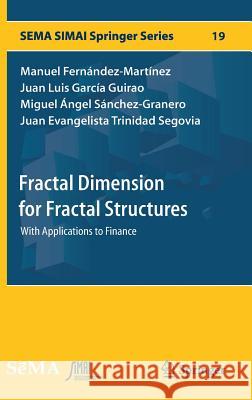Fractal Dimension for Fractal Structures: With Applications to Finance » książka
topmenu
Fractal Dimension for Fractal Structures: With Applications to Finance
ISBN-13: 9783030166441 / Angielski / Twarda / 2019 / 204 str.
Kategorie:
Kategorie BISAC:
Wydawca:
Springer
Seria wydawnicza:
Język:
Angielski
ISBN-13:
9783030166441
Rok wydania:
2019
Wydanie:
2019
Ilość stron:
204
Waga:
0.49 kg
Wymiary:
23.39 x 15.6 x 1.42
Oprawa:
Twarda
Wolumenów:
01
Dodatkowe informacje:
Wydanie ilustrowane











